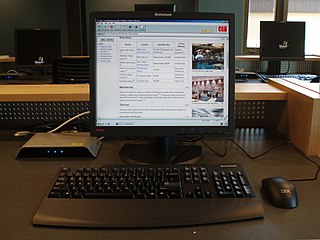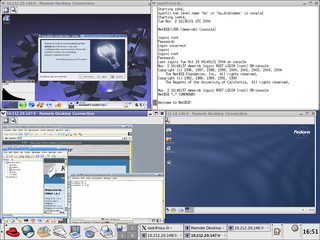
In computer networking, a thin client is a simple (low-performance) computer that has been optimized for establishing a remote connection with a server-based computing environment. They are sometimes known as network computers, or in their simplest form as zero clients. The server does most of the work, which can include launching software programs, performing calculations, and storing data. This contrasts with a rich client or a conventional personal computer; the former is also intended for working in a client–server model but has significant local processing power, while the latter aims to perform its function mostly locally.

Citrix Systems, Inc. is an American multinational cloud computing and virtualization technology company that provides server, application and desktop virtualization, networking, software as a service (SaaS), and cloud computing technologies. Citrix products were claimed to be in use by over 400,000 clients worldwide, including 99% of the Fortune 100, and 98% of the Fortune 500.
Independent Computing Architecture (ICA) is a proprietary protocol for an application server system, designed by Citrix Systems. The protocol lays down a specification for passing data between server and clients, but is not bound to any one platform. Citrix's ICA is an alternative to Microsoft's Remote Desktop Protocol (RDP).

Xen is a free and open-source type-1 hypervisor, providing services that allow multiple computer operating systems to execute on the same computer hardware concurrently. It was originally developed by the University of Cambridge Computer Laboratory and is now being developed by the Linux Foundation with support from Intel, Citrix, Arm Ltd, Huawei, AWS, Alibaba Cloud, AMD, Bitdefender and epam.
Desktop virtualization is a software technology that separates the desktop environment and associated application software from the physical client device that is used to access it.
Ericom Software, Inc. is a Closter, New Jersey-based company that provides web isolation and remote application access software to businesses.
Remote Desktop Services (RDS), known as Terminal Services in Windows Server 2008 and earlier, is one of the components of Microsoft Windows that allow a user to initiate and control an interactive session on a remote computer or virtual machine over a network connection. RDS was first released in 1998 as Terminal Server in Windows NT 4.0 Terminal Server Edition, a stand-alone edition of Windows NT 4.0 Server that allowed users to log in remotely. Starting with Windows 2000, it was integrated under the name of Terminal Services as an optional component in the server editions of the Windows NT family of operating systems, receiving updates and improvements with each version of Windows. Terminal Services were then renamed to Remote Desktop Services with Windows Server 2008 R2 in 2009.
VMware Horizon is a commercial desktop and app virtualization product developed by VMware, Inc for Microsoft Windows, Linux and macOS operating systems. It was first sold under the name VMware VDM, but with the release of version 3.0.0 in 2008 it was changed to "VMware View". The name was updated to "Horizon View" with the launch of version 6 in April 2014 and is now referred to as "VMware Horizon" to represent desktop and app virtualization.
A hosted desktop is a product set within the larger cloud-computing sphere generally delivered using a combination of technologies including hardware virtualization and some form of remote connection software, Citrix XenApp or Microsoft Remote Desktop Services being two of the most common. Processing takes place within the provider's datacentre environment with traffic between the datacentre and the client being primarily display updates, mouse movements and keyboard activity.

Systancia is a French software company that develops software for desktop and application virtualisation, cloud computing and remote access security solutions. It was founded in 1998 and is located in Sausheim, France.
XenClient is a discontinued desktop virtualization product developed by Citrix that runs virtual desktops on endpoint devices. The product reached end of-life in December 2016. Desktops are run locally, without hosting applications or the operating system in a datacenter. It consists of a Type-1 Xen client hypervisor and a management server, which provides features such as centralized provisioning, patching, updating, monitoring, policy controls, and de-provisioning. It enforces security through features including AES-256 full disk encryption, VM isolation, remote kill, lockout, USB filtering, and VLAN tagging. XenClient supports use cases such as disconnected operation on laptops, limited connectivity environments, and other use cases where use of local execution is desired and centralized management is required.
Founded by Alex Vasilevsky, Virtual Computer was a venture-backed software company in the Boston area that produces desktop virtualization products, which combine centralized management with local execution on a hypervisor running on PCs. By running the workload on the PC, Virtual Computer enables companies to have centralized management without servers, storage, and networking required for server-hosted VDI.
Remote mobile virtualization, like its counterpart desktop virtualization, is a technology that separates operating systems and applications from the client devices that access them. However, while desktop virtualization allows users to remotely access Windows desktops and applications, remote mobile virtualization offers remote access to mobile operating systems such as Android.
Citrix Workspace is a digital workspace software platform developed by Citrix Systems. Launched in 2018, it is Citrix Systems' flagship product. Citrix Workspace is an information retrieval service where users can access programs and files from a variety of sources through a central application or a Web browser. In addition to Citrix Virtual Apps and Desktops, Citrix Workspace services include Citrix Endpoint Management, Citrix Content Collaboration, Citrix Access Control, microapp capabilities, usage analytics, and single sign-on capabilities to SaaS and Web apps.
Citrix Virtual Apps is an application virtualization software produced by Citrix Systems that allows Windows applications to be accessed via individual devices from a shared server or cloud system.
Citrix Cloud is a cloud management platform that allows organizations to deploy cloud-hosted desktops and apps to end users. It was developed by Citrix Systems and released in 2015.
NetScaler is a line of networking products owned by Cloud Software Group. The products consist of NetScaler, an application delivery controller (ADC), NetScaler AppFirewall, an application firewall, NetScaler Unified Gateway, NetScaler Management & Analytics System, and NetScaler SD-WAN, which provides software-defined wide-area networking management. NetScaler was initially developed in 1997 by Michel K Susai and acquired by Citrix Systems in 2005. Citrix consolidated all of its networking products under the NetScaler brand in 2016. On September 30th 2022, when Citrix was taken private as part of the merger with TIBCO Software, NetScaler was formed as a business unit under the Cloud Software Group.
Ericom Connect is a remote access/application publishing solution produced by Ericom Software that provides secure, centrally managed access to physical or hosted desktops and applications running on Microsoft Windows and Linux systems.
Citrix Virtual Desktops is a desktop virtualization product.



